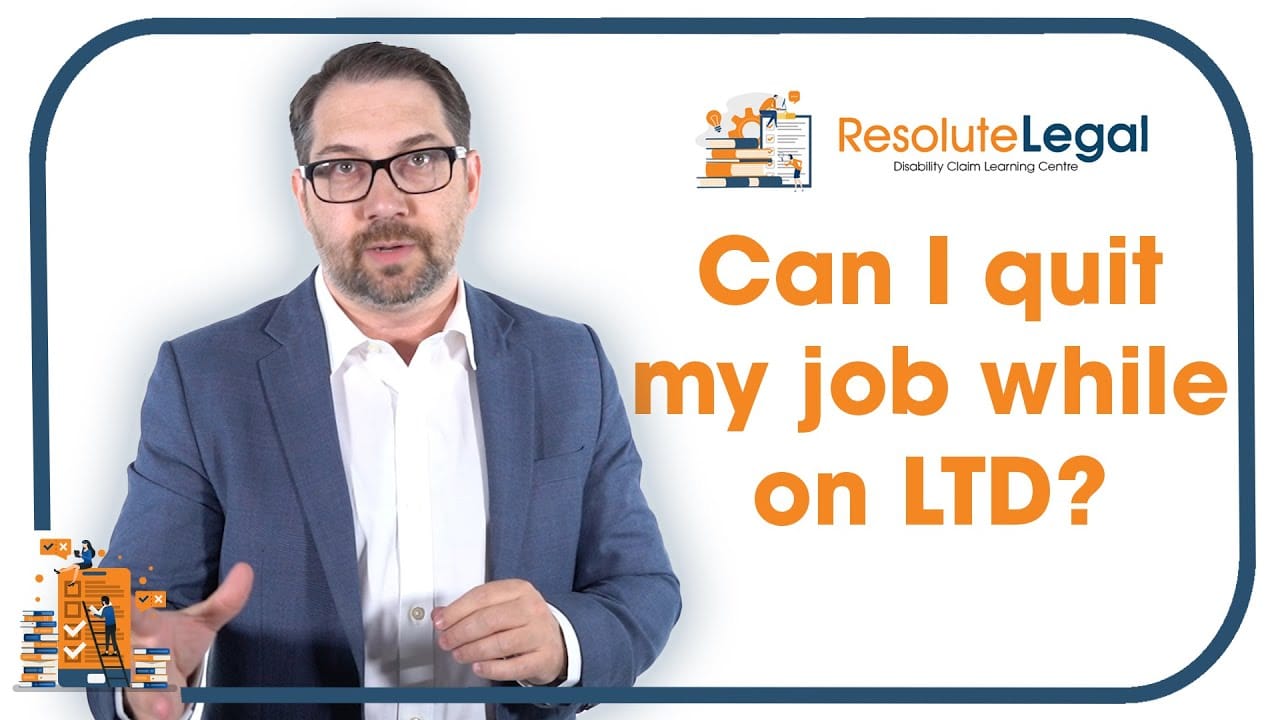Yes, you can quit your job while on long term disability, but doing so can impact your benefits and may lead to complications with your claim. Insurance providers might cut off benefits or add hurdles to your case, so it’s essential to seek legal advice before deciding.
This article explains what happens to your benefits if you quit your job, and covers key considerations, legal insights, and tips on avoiding pitfalls when managing a disability claim.
What effects does quitting your job have on your long term disability claim?
Quitting your job while dealing with a long-term disability (LTD) claim is a serious decision that requires careful consideration. Whether you’re thinking about applying for benefits, awaiting a claim decision, appealing a denial, or actively receiving benefits, resigning could significantly impact your claim. At any stage, consulting an experienced disability lawyer can help ensure you’re making an informed choice.
To be clear, your insurance company can’t legally stop you from resigning. However, they may respond by discontinuing your benefits or adding complications to the process. In most cases, quitting makes it harder to access or maintain benefits, both now and in the future. Before resigning, it’s essential to consider your reasons and whether they outweigh the potential downsides.
The independence of your LTD claim from employment status
Your employment and your LTD claim are technically separate. Most insurance policies are triggered by specific “crystallizing events” — such as when you become disabled and apply for benefits — which solidify your right to benefits, regardless of your employment status. In theory, you could leave your job and still receive LTD benefits because your claim runs independently of your employment.
In reality, though, resigning often brings about challenges. Let’s look at some common issues that can arise if you quit while on an LTD claim.
1. Risk of ineligibility if you quit before applying for LTD benefits
If you’re considering applying for LTD but haven’t yet submitted your application, resigning could jeopardize your eligibility. Many insurance policies require you to be actively employed when applying for LTD. By quitting, you might make yourself ineligible, so holding off on resignation until after applying is typically advised.
2. Raising red flags with the insurer
Leaving your job can raise concerns for your insurance company. They may question if your decision was driven by a difficult work environment rather than a genuine disability, which could lead to a benefit denial or increased scrutiny. This scrutiny could complicate or delay your claim.
3. New employers are not required to accommodate your disability
Under the Human Rights Act, your current employer has a duty to accommodate you, provided it doesn’t create undue hardship. If you resign, you’re back in the job market, where new employers aren’t obligated to provide accommodations. This could make finding and keeping a job more difficult and may affect your LTD coverage.
4. Potential denial due to pre-existing condition exclusion
If you take on a new job, your condition could be considered a pre-existing one under a new insurance policy, depending on the specific terms. Generally, a pre-existing condition is defined as any medical condition treated before the policy began. Most policies exclude coverage for pre-existing conditions for a certain period (often six months to two years), which could mean you wouldn’t qualify for LTD if your condition relapses.
Some policies also include a “recurrent disability” clause that may allow you to return to benefits without reapplying, depending on how long you remain employed. However, this can be challenging if you’ve resigned, so consulting a disability lawyer is wise if you’re in this position.
5. Requirement to follow insurer’s rehabilitation plan
Under many LTD policies, claimants must comply with insurer-recommended rehabilitation or return-to-work plans. Insurers often assume your best shot at returning to work is with your former employer, who has a duty to accommodate you. Refusing a rehabilitation plan based on returning to your previous employer could risk your benefits, as insurers may see it as non-compliance.
6. Limits on reapplying for benefits if the recurrence period ends
Most LTD policies allow claimants to resume benefits if they become ill or disabled within a specific timeframe, typically six to twelve months after returning to work. However, if you quit and miss this window, you will need to reapply and undergo a waiting period if your disability recurs. By staying employed and continuing to pay premiums, you maintain your entitlement to benefits, even beyond the recurrence period.
The key issue with quitting is that if you resign and take a new job, then become ill after the recurrence period ends, you will lose the ability to reapply for benefits under your original policy. In other words, quitting and missing the recurrence window means forfeiting your right to LTD benefits. On the other hand, remaining employed and continuing to pay premiums ensures that you retain that right, even after the recurrence period expires. It’s crucial to understand that quitting could jeopardize your ability to access benefits again if your disability returns after this critical time frame.
7. Some policies require you to be employed to qualify for recurrent disability
Increasingly, some policies only permit claimants to resume benefits under the recurrence clause if they’re still employed by the original employer. This restriction could prevent you from resuming benefits if you quit, even within the recurrent disability period. Reviewing your policy’s language around recurrent disability is essential.
8. Losing severance and other employee-sponsored benefits
If you quit, you won’t qualify for severance pay, which only applies if your employer initiates the termination. Staying with your employer may allow you to receive severance if they eventually terminate you due to frustration of contract. Additionally, by resigning, you may lose access to other employer-sponsored benefits, like medical or pension plans, as these often require active employment. Remember, if you’re on LTD, you’re still considered an employee, keeping these benefits intact.
Can you quit your job while on short-term disability in Canada?
Yes, quitting a job while on short-term disability in Canada is possible, but it’s essential to understand that doing so can affect your benefits and potentially complicate your claim. Before making this decision, consider the potential impacts on your coverage and seek legal advice if needed.
Leaving a job during an active short-term disability claim can lead to termination of benefits, depending on the terms of your disability insurance policy. Employers and insurance providers may review your claim closely, potentially causing delays or even denials if they believe quitting signals an improvement in your health or readiness to work. Consulting a disability lawyer can help clarify the implications specific to your situation.
Do you have to pay back short-term disability if you quit?
Generally, you do not have to pay back short-term disability benefits if you quit, as these benefits are paid based on your eligibility at the time of the claim. However, there are exceptions, especially if you received an advance or overpayment, which may require repayment.
In some cases, if you received disability payments in advance or if there was an error in the amount paid, you might be required to reimburse the insurer or employer. Checking your policy or consulting a disability lawyer can help clarify if any repayments apply to your situation.
What happens to benefits when leaving a job?
When you leave a job, several benefits beyond short-term and long-term disability may be affected. Most employer-provided health benefits, such as extended health coverage, dental, and prescription plans, typically end upon resignation. However, some employers offer extended coverage for a short period after departure, so it’s worth reviewing your benefits package.
If you have an employer-sponsored retirement or pension plan, you’ll need to review the options for transferring or withdrawing funds, which may involve tax implications. Additionally, life insurance policies provided by employers usually end with employment, though conversion options to individual policies may be available within a specified timeframe.
Final Thoughts: Can I quit my job while on long term disability?
Quitting your job while on LTD is a significant decision that can complicate your benefits and future claims. As tempting as it may be to step away from a challenging work environment, doing so can have serious implications. While your LTD claim is technically independent of your employment status, resigning can raise red flags with your insurer, potentially lead to the discontinuation of benefits, and make it harder to qualify for future claims. It’s critical to understand these risks before making such a decision.
If you’re considering quitting while on short-term disability, the consequences are similarly impactful. Employers and insurers may interpret your resignation as a sign that you are ready to return to work, which could result in the termination of your benefits. And while you generally won’t have to pay back short-term disability benefits, exceptions like overpayments could still apply, so it’s important to review your policy and seek professional guidance.
Before making any decisions, it’s crucial to fully understand the potential ramifications on both your disability benefits and your financial stability. Consulting with a disability lawyer can help clarify how your specific situation might play out and ensure that you’re making the best choice for your long-term health and well-being.
At Resolute Legal, we understand the complexities surrounding disability claims and can guide you through the process, helping to protect your rights and benefits. If you’re facing a difficult decision, like quitting your job while on disability, don’t hesitate to reach out to our experienced team for a free consultation. We’re here to help you navigate this challenging time.
FAQs: Can I quit my job while on disability
Am I still employed while on long-term disability in Canada?
Can you quit while on medical leave?
Does long-term disability continue after termination?
Free Book Offer



